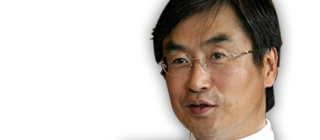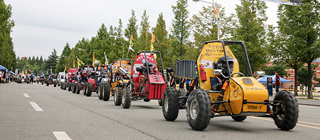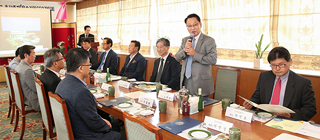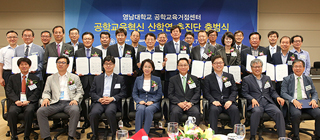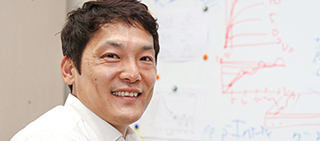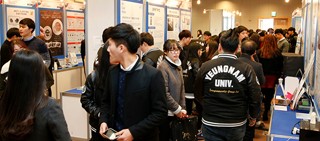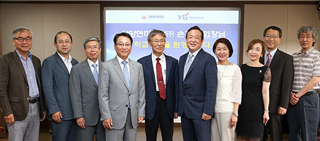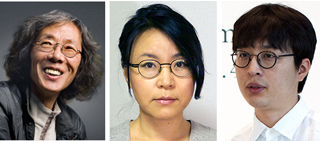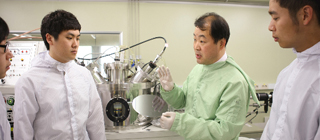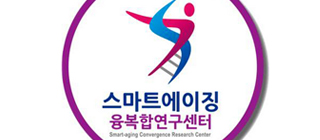-
Kimchi lactobacillus found to have excellent anti-virus effects for corona virus, etc First time in the world to investigate anti-virus effects of kimchi lactobacillus International collaborative research between Korea and Malaysia opens new possibilities to develop drugs using kimchi lactobacillus Distribution begins to respiratory disease patients in the Bundang area including the Bundang 21st Century Yonsei Hospital [July 7, 2015] A college research team in Korea announced research results stating that kimchi lactobacillus is effective for preventing and treating viral diseases such as the corona virus family, which includes MERS-CoV and influenza. The ‘Customized Medical Research Team’ (Director – School of Biotechnology Professor Park Yong-ha), a research institute under YU (President Noh Seok-kyun), announced that it became first in the world to prove that lactobacillus extracted from kimchi has vast preventive and treatment effect for corona virus, influenza virus and pathogenic bacteria diseases. It scientifically proved that kimchi is a health food that could protect the health of people around the world. The international collaborative consortium research team comprised of Professor Park Yong-ha, Professor 리옹 of USM University in Malaysia, the multi-national company ‘3M’, animal testing company ‘Teroka Jaya’, and the Korean company specializing in bacillus ‘Probionic’ carried out research on antibiotic feeds to substitute for livestock (chicken) of kimchi lactobacillus for the past year. In result, it was proven that the ‘Lactobacillus Sakei Probio 65’ host found in kimchi lactobacillus could replace the antibiotics in livestock feed involving disputes over the abuse of antibiotics. In addition, upon injecting the ‘Lactobaccillus Sakei Probio 65’ host in 2,000 mother pigs infected with the animal corona at a hog farm near the Daedeok Research Complex and at YU, it showed 100% recovery in clinical trials in just one week. When animals consume kimchi lactobacillus, lgA, an antibody in the blood, is secreted in the mucus membrane. Through this, the host is defended against attacks by viruses, while immuno-globulin G and gamma interferon is increased in the body, scientifically proving the mechanism that prevents infection by corona virus. <Kimchi Lactobacillus Anti-Corona Virus Activity> Type of Corona Virus: PED Corona Virus (PED-CoV) Cell Host: Vero cell separated from monkey kidneys Kimchi Lactobacillus: Lactobacillus sakei Cells infected with PED-CoV / Suppression of infection by L. Sakei Such research results were recently presented through a joint press conference of Professor Park and University Sains Malaysia (USM) Dean Osman, and reported by Malaysia’s national TV station, Malaysia 1 News and other media including the Malaysis Insider. Professor Park and the joint research team is planning to report parts of the research results at the ‘Asia Lactobacillus Conference’ that will be held in Bangkok, Thailand from the 8th to 11th of this month as well. On this, YU Customized Medical Research Team Director, Professor Park Yong-ha said, “These research results not only open up the possibilities of developing new drugs that can deal with corona virus and influenza, as well as immunity-related diseases such as atopy, but it will also contribute greatly in the globalization of kimchi as a health food.” He added, “We have already launched the product in early June through domestic bio companies and we are planning to distribute them to the world in the future. We are receiving a flood of orders from Japanese pharmaceutical companies.” *Comparative Experiment of Anti-bacterial Capacities of Probio Hosts - Displays excellent anti-bacterial effects (alternative antibiotic abiity) compared to foreign lactobacillus that have been commercialized These research results are receiving great attention from the domestic medical circles. Doctors in the Bundang area such as the 21st Century Yonsei Hospital in Bundang, Gyeonggi-do are expecting that the Lactobaccillus Sakei Probio 65 kimchi lactobacillus will be effective for preventing not only MERS, but also influenza, and began recommending kimchi lactobacillus to over 10 patients who frequently suffer from respiratory diseases since the end of June. Once the effects are verified, they are planning to begin full-fledged clinical studies. Meanwhile, Professor Park is an acclaimed authority on lactobacillus research for over 30 years, and reported ‘Lactobacillus kimchii’ for the first time in the world to the international academic circles to establish the position of Korea as the home of kimchi. He also teamed up with Professor Han Yoon-soo (Pediatrics) at Chungbuk National University and Probiotics (CEO Lee Hyun-joo) in an industry-academic cooperate research team to study the atopy immuno-disease treatment effects of kimchi microorganisms, and discovered the kimchi lactobacillus, ‘Lactobacillus Sakei Probio 65’ for the first time in the world. Upon applying on atopy diseases, it was found to effectively reduce cytokine that worsens immuno-diseases and improve it by over 238%, while publishing the mechanism through scientific clinical trials in an acclaimed international academic journal in 2010. He also published multiple research results stating that kimchi lactobacillus had excellent preventive and treatment effects of PED corona virus that causes epidemic diarrhea in hogs. Professor Park completed registration of international patents for such kimchi lactobacillus and received approval by the Ministry of Food and Drug Safety in 2013 as an individually recognized health functional food ingredient for the Lactobacillus Sakei Probio 65. Professor Park said, “Lactobacillus Sakei Probio 65 extracted from kimchi has the broadest anti-corona virus, anti-influenza, and anti-pathogenic bacteria effects than any other lactobacillus discovered, and its immuno-improvement effects were also proven through multiple tests.” He added, “Our country will play a leading role in the development of new drugs for preventing and treating various diseases such as corona virus diseases such as SARS and MERS, influenza, as well as immuno-diseases such as atopy.”
-
From 16th to 18th at YU Gyeongsan Campus, 38 teams fro m26 universities compete fiercely Overall best goes to KOREATECH ‘Ja.Yeon.In.’ Team, YU teams take 2nd and 3rd places [July 18, 2015] <2015 Baja SAE Participant Car Parade> The race to dreams, ‘Baja SAE KOREA at Yeungnam University 2015’ completed its three days of excitement and held its finale on the 18th. In this tournament, which celebrated its 20th anniversary this year, ‘Ja.Yeon.In’ Team of KOREATECH took first place to receive the Minister of Trade, Industry and Energy Award, trophy, winner’s flag and a cash prize of 3 million won. 2nd place when to the ‘YUSAE’ team of YU and the YU ‘CMDM A’ team. The ‘YUSAE’ and ‘CMDM' teams of YU took first and second place in the 2014 tournament, and thus placed in the top three for the second straight year to show that they are powerhouses in vehicle building tournaments. For each sector ’Team Miracle’ of Hanbat University and ‘Speeding B’ team of Keimyung University took the durability awards, YU ‘CMDM Bteam’ took the acceleration award, ‘Team Exponential’ of Ulsan University took the rock-climbing award, and ‘Baqu4’ of Hanyang University took the mobility award. <KOREATECH ‘Ja.Yeon.In’ Team – Grand Prize> 38 teams from 26 universities including KOREATECH and Hanyang University participated in Baja SAE 2015 that was held at the YU Gyeongsan Campus from the 16th to 18th to compete fiercely. Team leader Lee Won-min (24, Mechanical Engineering, junior) of the Chungnam National University ‘Four Wheels Team’ said, “This is already my third time participating since I was a freshman. The level of participants continuously improve every year and so I learn a lot after the tournament ends.” He added, “Despite this having excellent race tracks and infrastructure compared to any other tournament, it’s disappointing that there are not more participating universities. I hope that next year, more students will participate so that this can be a festival for us to see and learn more.” The participants who parked the vehicles that they built with their own hands at the designated parking lot on the 15th registered at 8 a.m. on the 16th at 8 a.m. and began static tests that included vehicle design creativity, structural stability, driver convenience, ease of maintenance, and mass-productivity, followed by basic control inspections and rule meetings until late in the evening. At 9 a.m. on the 17th, they held the official opening ceremony with the attendance of all participating teams, volunteers and sponsoring institutes at the main field and began a car parade of participating teams at the main field and streets around the school. In the afternoon, the dynamic test was held to measure acceleration, max speed, towing power, rock climbing, and passing mud waters. On the 18th, durability tests, which was the highlight of the tournament, was held on a 3.2km off-road track at the hill behind the YU water purification center. Professor Hwang Pyeong (Mechanical Engineering), the chairman of the competition who has been responsible for operation of the tournament for 20 years, said, “Students worked hard from design and production of their vehicles for about a year to participate in the tournament,” and added, “The theories they learned in class and field experience through this tournament will be valuable assets to students.” ‘Baja SAE Korea’ is a tournament for students to compete with vehicles they build ground-up and began in 1996. It received approval for the first time in Korea by the US SAE (Society of Automobile Engineers) in 2001 and became an international competition being held annually at YU. Results of the competition are published to the entire world through the SAE official homepage (www.sae.org) and publications.
-
Held CEO luncheon by inviting outstanding companies in the region Companies request excellent human resources with expertise Pursuing various industry-academic cooperation such as employment-linked field work, joint research-technical support, and retraining of current employees [July 16, 2015] <YU President Noh Seok-kyun holds meeting by inviting CEOs of outstanding companies in the region.> YU President Noh Seok-kyun is working hard to support employment of students and to strengthen industry-academic cooperation. YU President Noh Seok-kyun held a meeting by inviting CEOs of outstanding companies in the region at the Saint Western Hotel of Daegu on the 15th. The goal is to construct an industry-academic cooperative system for the mutual development of the university and companies. This was planned to expand the understanding on fostering human resources and industry-academic cooperation between universities and companies, and for universities to understand the human resource fostering and industry-academic cooperation method required by companies, and to reflect them in the major policies of the university in the future. YU is planning to pursue practical industry-academic programs such as fostering excellent human resources, promoting employment, internship programs, and constructing industry-academic clusters by industry through the continuous networking with regional small and medium sized companies. At this meeting were present YU President Noh Seok-kyun, Student Capacity Development Office Director Kim Young-tak, Industry-academy Cooperation Team Director Park Jin-ho, and Corporate Support Center Director Kim Seung-cheol, as well as CEOs from 10 outstanding small and medium sized companies of the region such as Kim Gyeong-jae of Nicca Korea, Choi Woo-seok of Daesung Hitech, Hong Byung-jin of Data Bank Systems, Lee Jung-ho of Seshin Precision, Kim Gwang-hyeon of Avaco, Park Myeong-seob of Avatec, Kim Chang-ho of Ajin Xtek, Kang Young-cheol of SSLM, Choo Gyo-hwan of Wini Tech, and Lee Young-jin of Taeyang Electronics. Daesung Hitech CEO Choi Woo-gak said, “It is important, but difficult to procure outstanding human resources for small and medium sized companies,” adding, “It would be great if universities and companies could continuously cooperate to work together to foster excellent human resources.” Nicca Korea CEO Kim Gyeong-jae said, “We are always in need of master’s or PhD-level researchers with expertise. I hope that the university will show a lot of interest in this and work hard to foster specialized researchers.” Likewise, the CEOs of participating companies all stated that the role of the university to foster human resources with expertise in various fields is crucial. In response, Mr. Noh said, “I feel a great sense of responsibility as the head of an educational institute receiving such requests for fostering specialized human resources from you.” He added, “I hope that you continuously give us feedback for the role of our university and areas in need by companies in the future. Our university will listen closely to the voices of companies and work hard to cooperate actively.” YU signed MOUs with several companies that attended this meeting and is operating field education courses. YU is planning to expand industry-academic cooperation in various sectors such as employment-linked long-term field work, retraining of current employees, and industry-academic research for college technical support. Meanwhile, a special lecture was held by YU Professor of International Commerce Sohn Sang-bum under the theme ‘Response Strategies of Korean Companies to Enter the Chinese Market’, and received great responses from the attending CEOs.
-
Launched ‘YU Engineering Education Innovation Industry-Academy-Research Team’ on the 14th Mutual growth of university and industry expected through fostering of excellent engineering human resources Convergence human resources fostering in the ‘automobile smart convergence parts and internet of things’ sector linked to the regional industries [July 14, 2015] The ‘Engineering Education Innovation Industry-Academy-Research Team’ to support the employment and start-up of students, while fostering excellent human resources in engineering was launched at YU (President Noh Seok-kyun). The YU Engineering Education Hub Center (Director Sohn Dong-joo) held a launching ceremony of the ‘YU Engineering Education Innovation Industry-Academy-Research Team; at the YU HRD Business Team at 11:30 a.m. on the 14th. This ceremony, which was held sponsored by the Ministry of Trade, Industry and Energy (Minister Yoon Sang-jik, hereinafter MOTIE), was attended by industry, academic and research institutes in the region such as the Daegu Chamber of Commerce, Gyeongbuk Chamber of Commerce Association, Daegu-Gyeongbuk Regional Office of Small and Medium Companies, Daegu-Gyeongbuk Creative Economy Innovation Center, and the Daegu-Gyeongbuk Techno Park. In June the MOTIE launched the second (2015 – 2017) Engineering Education Innovation Center, as well as the ‘Engineering Education Innovation Industry-Academy-Research Team’ together with 71 engineering education innovation centers around the nation including the Korean Chamber of Commerce and the Federation of Korean Industries, as well as major industry-academy-research institutes such as the Engineering Education Innovation Center, Creative Economy Innovation Center Association and the Korea Techno Park Association. Participating institutes included six engineering education hub centers around the nation including YU, Korea University and the Seoul National University of Science and Technology that signed MOUs to compose teams by hubs joined by the industry, academic and research centers of each region. As part of this, the ‘YU Engineering Education Innovation Industry-Academy-Research Team’ in the Daegu-Gyeongbuk area for the first time in the nation. This ceremony was attended by YU President Noh Seok-kyung MOTIE Industry Policy Chief Park Il-joon, Daegu Deputy Mayor of Economy Kim Yeon-chang, Gyeongbuk Vice-governor Lee In-seon, Korea Institute for the Advancement of Technology Director Yeo In-guk, Gyeongbuk Creative Economy Innovation Center Chief Kim Jin-han, Daegu Creative Economy Innovation Center Chief Yeon Gyu-hwang, Gyeongbuk Techo Park Director Lee Jae-hoon, Daegu Techno Park Director Gwon Eop, Gyeongbuk Chamber of Commerce Association Chairman Yoon Gwang-soo, Daegu Chamber of Commerce Vice-chairman Moon Young-soo, Korea Small and Medium Business Association Daegu Branch Director Jung Jin-gwang, Daegu-Gyeongbuk Advanced Venture Company Association Chairperson Kim Ji-mi, and other key figures of industry, academics and research by the central and local governments, and the region to agree on cooperation. The YU Engineering Education Innovation Hub Center and regional industry-academy-research institutes signed MOUs and agreed to strengthen field-based education according to industrial demands for students and to foster their capacities for employment in outstanding regional companies and to support start-ups. With the launching of this team, YU is planning to lead local industries through cooperation with engineering colleges in the Daegu-Gyeongbuk region and local industrial and relevant institutes, while concentrating support for fostering young engineers who will lead new industries in the future and to help them find employment and start new companies. In particular, YU is planning to operate undergraduate programs in the ‘ICT-based automobile smart convergence parts and internet of things’ linked to regional industries among key future technologies to preemptively foster excellent human resource sin the convergence technology fields. Furthermore, by operating education programs linked to institutes that signed MOUs, it is planning to foster practical engineering human resources, and help them transform their creative ideas into business opportunities. YU President Noh Seok-kyun stated, “With the launching of the industry-academy-research team, we provided a cornerstone for colleges and regional industries to mutually develop,” and added, “We will team up with local industry-academy-research institutes so that the YU Engineering Education Hub Center can take the lead in fostering outstanding human resources that will lead the future.” Meanwhile, the government has been operating engineering education innovation centers in 71 universities around the nation since 2007 to foster engineers equipped with practical field capacities in need by the industry. Of the 71 innovation centers, six universities were designated as hub centers to provide excellent engineering education innovation models and to spread achievements. In May, YU was selected for the second Phase 2 Engineering Education Innovation Hub Center that will be effective until February 2018. Thus, YU will be the Engineering Education Innovation Hub Center for six straight years from the first phase that began in 2012.
-
Department of Physics Professor Shin Jae-cheol developed new ‘nanowire’ synthesis technology to produce short-wavelength infrared detection sensor Core technologies needed to develop next-generation electric/electronic materials such as memory and sensors Possible to integrate meters for sugar in fruits and blood-sugar, as well as night vision goggles Published in latest issue of world’s most reputable academic journal <Scientific Report> [Jun 19, 2015] Department of Physics Professor Shin Jae-cheol (39, photo) developed new technologies to efficiently synthesize the promising next-generation technology of nanowire in silicone substrates and successfully produced a short-wavelength infrared detection sensor using this. Nanowires are very fine fan-shaped wires with nanometer (nm, 1m/1 billion m) diameter and is receiving attention as core future technologies needed to develop advanced electric and electronic elements such as transistors, memory, and various sensors. Currently, semiconductor nanowires used metal nano-particles or nano-patterning technologies for synthesis. However, such methods have the weakness that they require high cost and time, and therefore have limitations in commercialization. In 2013, Professor Shin Jae-cheol developed technologies to synthesize indium arsenide (InAs) on top of a 2 inch silicon substrate using a catalyst-free, pattern-free method, and in this study, these technologies were used to produce a short-wavelength infrared detection sensor with 1~3 micrometer (μm) wavelengths. Until now, chemical semiconductor substrates such as InAs and lead selenide were used to produce short-wavelength infrared detection sensors, but such material substrates have the weakness that they are dozens of times more expensive than silicone. But with this study, such problems were resolved. It is expected that silicon-based InAs nanowires produced with this technology can be applied not only in short-wavelength infrared detection sensors, but in other technological sectors such as solar cells, LED, lasers, and transistors. Professor Shin, who participated in this study as a corresponding author, said, “Short-wavelengths of 1~3μm can penetrate into substances to some degree, so it can be used to check for irregularities in fruits, blood-sugar inspection, and skin disease examinations. Furthermore, it detects the reflections of infrared rays copied in the atmosphere so it can be used for night-vision goggles and for rescue cameras in the case of fires, thus having high usability.” He added, “By further developing the short-wavelength infrared photodetector through the silicon-based InAs nanowire synthesis developed in this study, it will be possible create a new market as fruit sugar meters, blood sugar meters, and night vision goggles that can be mounted on smart phones can be manufactured, which was not practice in the past due to cost issues, and it will thus lead the global market.” Professor Shin earned his PhD at the University of Wisconsin-Madison and worked as a researcher at the Korea Photonics Technology Institute’s Biophotonic Research Center and has been serving as a professor at YU since September 2014. Professor Shin said, “My main field of study was photoelectronic elements such as solar cells, infrared red photodetectors, LED and lasers,” and added, “I will continue research on developing high-performance photoelectronic elements that are inexpensive through semiconductor nanostructures.” Meanwhile, this study was published under the title ‘Short-wavelength infrared photodetector on Si employing strain-induced growth of very tall InAs nanowire arrays’ in the latest online version (June 2015) world-class academic journal in the top 7.3% of the relevant field, <Scientific Reports, impact factor (IF) 5.078>.
-
Only non-Seoul area university selected, up to 2 billion won in funding for 3 years Act as ‘Control Tower’ for venture start-up related organization in university Expected to strengthen actual start-up capacities of college students and promote venture start-ups Student venture start-up performance rising at Seoul National University and Hanyang University that operates Entrepreneur Centers [Jun 28, 2015] <‘YU Venture Start-up Culture Road Show’ held at the YU Cheonma Art Center in February'> YU (President Noh Seok-kyun) was selected for the ‘College Entrepreneur Center’ and will thus accelerate support for student start-ups. YU was selected as a host university for the Korea Institute of Start Up & Entrepreneurship Development’s (Director Kang Si-woo) ‘2015 College Entrepreneur Center’ on the 25th and will be funded up to 2 billion won for the next three years. KISED designed this product to provide support so that colleges can be a cradle for fostering global entrepreneurs. It aims at supporting the strengthening the practical start-up education of colleges, construct and promote internal and external networks, and provide relevant education programs. YU became the only non-Seoul general university to host this project and is thus expected to act as a hub for supporting the start-up of college students in the region. KISED received applications from universities nationwide and made a general assessment through reviews on business plans submitted by universities, field inspections and face-to-face interviews. In result, YU was finally selected as the university to be supported for this program. In particular, YU was given high marks for possessing its own start-up infrastructure and a solid alumni network in both Korea and abroad. Furthermore, it received good assessments for its graduate school newly offering an entrepreneur spirit major, as well as its ‘two track strategy’ of simultaneously opening venture start-up courses and in-company entrepreneur courses. YU became the first to offer an entrepreneur major in its graduate school in Korea, and students in the departments of business administration, mechanical engineering and chemical engineering will be required to complete this as a mandatory course. Furthermore, it will become the first and only in the nation to open start-up courses and in-company entrepreneur courses as two-tracks. This is expected to help students not only who wish to start up their own business, but also students aiming to become employed in companies and current company workers to enhance their entrepreneur spirit. By being selected for this program, YU will carry out the program for three years from July of this year to June 2018. The program may be extended for an additional three years through a performance evaluation. The YU Entrepreneur Center will act as a control tower for the start-up fostering center and start-up education center that YU is currently operating, and it is also expected that industry-academic cooperation will be further solidified by connecting with the LINC business team. YU is planning to further solidify the venture start-up support organization within the university, open start-up education courses, develop education modules and contents, procure exclusive faculty and foster start-up experts, construct networks with specialized institutes pertaining to start-ups, and support start-up contests and venture start-up clubs to concentrate on strengthening the actual start-up capacities of students. The College Entrepreneur Center program is currently in operation at six universities from last year including Seoul National University, KAIST, POSTECH, Hanyang University, Sookmyung Women’s University, and Inha University. These universities not only offered start-up related education, but also supported item selection, prototype production, and pioneering sales channels, which are being shown through the achievements by venture start-ups by students. Hanyang University, which established its Entrepreneur Center in 2009, led to the successful start-up of 20 students last year. Hanyang University offered the ‘Hanyang Start Up Academy’ for students to provide education on business feasibility analysis, financial design, and marketing. In particular, having engineering students take ‘techno management’ classes was assessed to greatly contribute in student start ups. In reality, ‘Office N (CEO Han Sang-won)’, which provides contents on corporate cultures, is a success case of start-ups through the ‘Hanyang Start Up Academy’. Office N CEO Han Sang-won participated in special lectures for ‘techno management’ to provide startup know-how to juniors. In addition, Lim Sung-hwan, who is enrolled in the Hanyang University Department of Chemistry started up the cosmetic and health product distribution and manufacturer ‘SeoSeo’ as a student in 2013 and brought up his business expecting to bring in 500 million won in sales this year. Mr. Lee began production of hair wax prototypes, cosmetic product imports and sales with cosmetic franchises with the assistance of the College Entrepreneur Center. Achievements are being made at the Seoul National University Venture Management Entrepreneur Center that was established in September of last year. SNU provided start-up education for students who selected the ‘venture management combined major’ as their double major and sent them to areas such as Silicon Valley in the United States to provide full support to raise their abilities as future business start-up owners. Kang Hyun-wook (24) who double majors in venture management and social education at SNU established ‘Bepro’ that manages the records of amateur soccer players in February of this year with the assistance of professors at the center with experience operating venture capitals. In just four months, this start-up signed data management contracts with the youth leagues of the Professional Football Association. Also, the Inha University Entrepreneur Center is operating a start-up support program called ‘Start Up Therapy’. It selects students with excellent start-up items through contests to provide start-up education, and provides full support so that they may compete in the market.
-
The late first Chairman Sohn Se-ho, Chairman Sohn Gi-rak and CEO Sohn Dong-gi of Samyang Abrasives ‘three generations of donations’ Continued donations for over 20 years for university development funds and student scholarships Also donated 130 cultural relics such as ceramics and ancient documents to the YU Museum [Jun 17, 2015] <from fourth on left, YU President Noh Seok-kyun, Chairman Sohn Gi-rak, CEO Sohn Dong-gi> A local company made news by continuing ties with YU over three generations. This is the story of Samyang Abrasives Co., a manufacturer specializing in grinding wheels located in Yeongcheon, Gyeongbuk. The father and son of Samyang Abrasives Co., which donated university development funds and scholarships to YU for over 30 years, Chairman Sohn Gi-rak (77) and CEO Sohn Dong-gi (53) visited YU at 11:30 a.m. on the 17th. Chairman Sohn met with YU President Noh Seok-kyun and said, “I am always thankful of YU for allowing us to share the cultural artifacts that my father collected throughout his lifetime with the community,” and added, “We will provide our support to contribute, even if it is just a little, to help the university develop into the region’s best university and to help students study.” Chairman Sohn donated a total of 85 million won since 2004 in the university development fund and ‘Hecht scholarship’. When including scholarships given to the students of the School of Materials Science and Engineering prior to 2004, donations to the development fund and scholarships for YU exceed way past 100 million won over the past 20 plus years. The ties of YU and Samyang Abrasives go back to the time when the late Suam Sohn Se-ho, first chairman of Samyang Abrasives and the father of the current Chairman Sohn, was in office. Following the wishes of his father, Chairman Sohn donated a total of 132 cultural artifacts including 118 ceramics including pottery from the Three Kingdoms Period, Goryeo Celadon, and Joseon Blue and White Porcelains, and 12 ancient documents to the YU Museum in 1976. There is another sector in the YU Museum containing only the donations of Suam, which are on permanent display. The ‘Hecht Scholarship’, which Chairman Sohn donates to every year, is a scholarship program with a 29 year tradition. The ‘Hecht Scholarship’ traces its history back to 1968 when Chairman Sohn was studying at Alfred University in Albany, NY in the US and became brother-like friends with a fellow student of engineering, Norman Hecht (77), honorary professor at the university of Dayton, Ohio and ties with Dr. Jang Sung-do (77, senior member of the Korean Academy of Science and Technology). In the spring of 1986, Professor Norman Hecht and Dr. Jang Sung-do attended an international conference held in Japan. At this time, Dr. Jang organized a special lecture for Professor Hecht to hold at Dr. Jang’s alma mater, YU. Dr. Jang was among the first batch of graduates from the University of Daegu, which later became Yeungnam University. As a token of his appreciation, Professor Hecht donated the entire fee he received for his lecture as a scholarship. Since then, his fellow scholars and long-time friends decided to donate scholarship for junior students of engineers and Chairman Sohn has still kept his promise. YU President Noh Seok-kyun said, “As the president of the university and a person of the community, I respect the practicing of ‘noblesse oblige’ by Chairman Sohn’s family who strived for the development of the community and university,” and added, “YU will also do its best to become a university that fulfill its social responsibilities taking to example such spirit.”
-
Of the 4 guest artists, 3 from YU ‘Y Artist’, sixth guest artists Yoon Dong-hee (Painting ‘02) holds solo exhibit ‘Daegu Trilogy’ that selects 3 established artists in the region includes Professors Kim Ho-deuk and Kim Hee-seon [Jun 17, 2015] <from left to right, School of Fine Arts Professor Kim Ho-deuk, Professor Kim Hee-seon, and Artist Yoon Dong-hee (Painting ‘02)> Professors and graduates of YU were invited to a top exhibit in the regional art circles. The Daegu Art Museum is holding two exhibits to introduce local artists in light of its four year anniversary, and three of the four guest artists to the exhibit were from YU. They are Professors Kim Ho-deuk (64) and Kim Hee-seon (48), and Artist Yoon Dong-hee (31). Artist Yoon Dong-hee is an up-and-coming artist who graduated from the YU School of Fine Arts (major in painting) in August 2011 and is currently active in Daegu. He was selected as the sixth guest artist of the ‘Y Artist’, which is a series exhibition of the Daegu Art Museum. The Daegu Art Museum began the ‘Y Artist’ project in 2012 to display the fresh senses of young artists and to provide the opportunity to find and promote promising artists in the area. <Yoon Dong-hee, Sunken Memory, Video installation and 304 glass cups> This exhibit, which is held under the title ‘Discovered Memory’, is being held from the 19th of last month until October 4 at Daegu Art Museum Exhibits 4 and 5. It displays a total of four pieces including drawings, videos, and installation art. In this display, Yoon expressed Korean history from a crossing perspective of personal history and macro-history through drawings, videos and installation art in a total of four pieces. These are a series of works to raise awareness on our thought process and social perception that has become a part of inertia through religious or political suppression, and to raise the audience’s critical mind. The main pieces are ‘Spirit’ that deals with the wounds of those sacrificed on the darks side of the brilliant modernization, as well as a historical perception on it, ‘Red Night’ that deals with the violence of national ideologies, and ‘Sunken Memories’ that deals with the social phenomenon and oblivion of the Sewol Ferry tragedy. These pieces do not employ traditional painting methods, but are expressed in a variety of ways to capture interest and attract participation of the audience. This method shows the artist’s thought on the theme directly and in detail, and aims at allowing viewers to easily share and understand it. Also, in the ‘Daegu Trilogy’ composed of three solo exhibits, Professors Kim Ho-deuk and Kim Hee-seon will show their works. The Daegu Trilogy was designed to share the today of the local art and look towards a leap into tomorrow by selecting three artists that represent art in the region. This exhibit displays the works of three veteran artists such as Kim Ho-deuk (Korean painting), Kim Hee-seon (media installation) and Lee Gi-chil (sculpture) who are actively engaged in the domestic and international art circles while residing in Daegu. The Daegu Trilogy will be on display until September 13 at Exhibit rooms 2 and 3 on the second floor of the Daegu Art Museum. It is expected to provide an opportunity to appreciate works of various genres such as Korean painting, installation art, sculpture, video, and multimedia art. Details on the exhibits are available at the Daegu Art Museum homepage (http://www.daeguartmuseum.org).
-
QS-Chosun Ilbo Rankings Shows YU’s Jump of 15 Places for Last 3 Years Big Jump Shown in Research Quality Indicated by Academic Reputation, Paper Per Faculty, Citations Per Paper Noticeable at Internationalization Index by International Faculty, International Students Natural Science Area Enters Top 100 in Asia, Balanced Rising in Every Science Area [2015-6-11] Yeungnam University (President NOH, Seok-Kyun) in 2015 Asian University Rankings noticeably moved up 12 notches in ranking than the previous year. According to the 2015 QS-Chosun Ilbo Asian University Rankings announced at 10th June, Yeungnam University(hereinafter called ‘YU’) moved up steeply and ranked 135th in Asia in terms of overall indices, while almost all universities in Korea largely showed low-toned performance. YU has been steadily in uptrend for the last 3 years. It was reported YU moved up 15 notches for three years since 2013. Especially this year, the index of ‘academic reputation’ pushed up YU into 118th place (16th in Korea) in Asia, 23 steps up from the last year. There is also a rise in ranking of the ‘research quality’, which is scored by paper per faculty and citations per paper. In terms of the evaluation in academic area, YU’s natural science area particularly moved up into 90th in Asia, which indicates an outstanding research quality. Besides the high-class positioning (12th) in ranking of natural science quality among universities in Korea, YU are also in the upper ranks in research quality of other academic areas such as engineering & technology (12th), bioscience & medicine(16th), human science & arts(23th). . Such high performance comes from a strict criteria of faculty employment and promotion under the catch phrase of “To be the Best Professors’ University“ and at the same time from the special attention on research support system for best faculty. Since the time the president NOH took his office in 2013, YU has provided an exceptional support on the research through the ‘Research Equipment Support Project.’ This Project is the only one case being carried out by YU among universities in Korea, which selects best 25 professors out of top 30% professors in research performance every year and supports them with a total of 4 million dollars of research fund for four years. The selected professors are obliged to publish one or more papers on the top 30% SCI journals in their professional fields within one and half year after finishing the research projects. Otherwise, the professors are not allowed to apply for school-funding projects any more and have no right to have the beneficiary research years. In addition, YU has invited and funded foreign young scientists through post-doctoral program and foreign research faculty program since 2008 and 2010, respectively, in order to encourage an international cooperative research for future synergy effect. As a policy system for strengthening the research ability, YU plans to appoint an outstandingly excellent faculty in research performance as a chair professor, and specially promote an excellent faculty in such performance to a higher position. According to the President NOH, “A long-term ceaseless support of research fund, equipment and human resource is more important for cultivating excellent research ability than a short-term investment, and such system is necessary for the support. We will spare no cost and no support as it is for more and better world-class performance.” A highly remarkable rise is shown also in Internalization Index. The number of foreign professor ranked 66th in Asia (13th in Korea), and the out-bound exchange students ranked 36th in Asia (15th in Korea), which are maximum 10 notches up from the last year. This is due to a daring investment by employing doubled number of foreign faculty than the last year and providing YU students with overseas learning opportunities of international internship and student exchange program. As of June in 2015, YU is now vividly engaged in international exchange activities by making sisterhood relationships with 301 universities and institutions in 40 foreign countries.
-
Medical Research Center(MRC) Awarded to YU, a Front-Leading Research Center Support Project sponsored by Ministry of Science, ICT and Future Planning and National Research Foundation of Korea Smart-aging Convergence Research Center Sets Up To Cure Aging Disease, Create Anti-aging Health Business, Enhance Quality of Life [2015-6-10] Let’s Age Young and Smartly till Nighty Nine Yeungnam University(‘YU’) became to lead the Smart Aging National Project sponsored by big fund of the Government. The Front-leading Research Center Support Project in basic medical area, the Medical Research Center(MRC) was awarded to YU. It is a sponsored by the Ministry of Science, ICT and Future Planning and the National Research Foundation of Korea. The Front-leading Research Center Support Project was firstly kicked off in 1990 in order to explore and cultivate an excellent research organization possessed with world-level creativity and capability and hence solve scientific difficulties and social issues. It is divided into three research areas such as medicine(MRC), science(SRC) and engineering(ERC). YU plans to set up the Smart-Aging Convergence Research Center (directed by MD. Kim Jae-Ryong) and continue to carry out the project till Feb. of 2022. Industry-University-Government will invest a total of over $11 million of funds in this Project which are consist of $6.7 million from government budget, $2.8million from university, $0.7million from Daegu Metropolitan City, $0.7million from Gyongsangbukdo Province and $0.2million-equivalent investment in kind from participating companies. The Laboratory Animal Center situated at Daegu Gyeongbuk Medical Cluster Valley, Dong-A ST as a pharmaceutical company and A&RT as a drugs R&D company will join this Project. Under the slogan of “Let’s Age Young and Smartly till Nighty Nine”, the Smart Aging Center aims to concentrate its research capability on new diagnostic and curing methods of aging diseases using the control of blood-vessel aging. The aging population is now a world issue as mentioned by the world prospect which foresees aging population older than 65 will over 40% by 2060. According to BCC Research, a world-level technical market search company, anti-aging industry market in the world will grow up to $420 billion dollars by 2030. The domestic anti-aging market is forecast to reach around $28 billion dollars by 2020 (SERI, 2013). YU became to lead the Smart Ageing Project at this point of time and, therefore, is expected to create a significant added value in terms of national economic aspect. YU has operated from 2005 to Feb of last year the Research Center of Senile Blood Vessel Disease (Director M.D. Kim Jae-Ryong) sponsored by the Ministry of Science, ICT and Future Planning and the National Research Foundation of Korea. Such previous performance was recognized and an opportunity to lead this large scale national project was again awarded to YU. Particularly, YU has possessed lots of human resources as the faculty and researchers who are excellent in medical/pharmaceutical/clinical areas related with aging and aging-disease fields. The specific research results of aging mechanism and its control have been continuously published in the SCI-level journals to strengthen an international reputation and positioning. “We will hopefully put anti-aging drugs and new antibody medicines to practical use and commercialize them. And, the development of new diagnostic and curing methods of aging disease will give us an opportunity to create new business of anti-aging health industry. This will allow us to contribute to the growth of local pharmaceutical and bio industries and furthermore human health, life extension and quality of life”, said the director of the Smart Aging Convergence Research Center, YU’s faculty of college of medicine M.D. Kim Jae-Ryong. Meanwhile, a total number of 49 proposals were submitted to apply for the 2015 Front-leading Research Center Support Project. Totally 8 proposals, composed of 3 proposals for MRC and 5 proposals for SRC, were finally selected this year.
